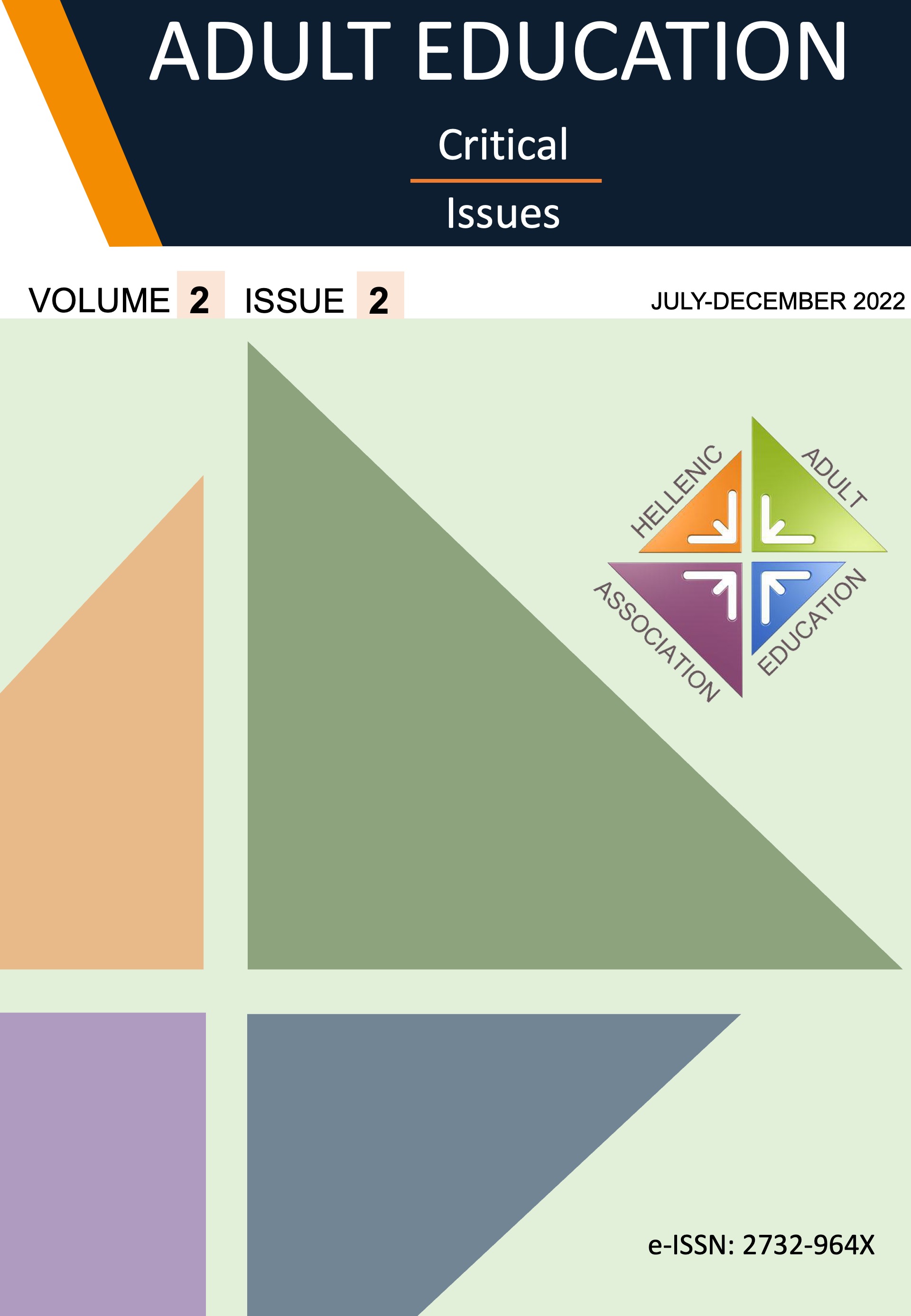Αριστοτέλης & σπουδαία τέχνη

Δημοσιευμένα:
dic 30, 2022
Λέξεις-κλειδιά:
Αριστοτέλης σπουδαία τέχνη κριτήρια μετασχηματισμός εκπαίδευση
Περίληψη
Το άρθρο αυτό προσεγγίζει το φιλοσοφικό έργο του Αριστοτέλη, γιατί αποτελεί τη
βάση όλης της μεταγενέστερης φιλοσοφίας. Η καθολικότητα που διακρίνει την
αριστοτελική σκέψη και οι θεμελιώδεις αλήθειες που περιέχονται σε αυτήν
καθιστούν τη φιλοσοφική του άποψη μεγάλη, καθολική και διαχρονική με βαθιά
ενόραση. Σε αυτό το πλαίσιο, η παρούσα μελέτη εστιάζει κυρίως στο έργο του
Αριστοτέλη, Περί Ποιητικής, που αναφέρεται κυρίως στην τραγωδία, και αντλεί
ορισμένα στοιχεία σχετικά με την ηθική διάσταση και την ευτυχία από το έργο του
Ηθικά Νικομάχεια.
Λεπτομέρειες άρθρου
- Πώς να δημιουργήσετε Αναφορές
-
Papadopoulou, M. (2022). Αριστοτέλης & σπουδαία τέχνη. ADULT EDUCATION Critical Issues, 2(2), 34–46. https://doi.org/10.12681/haea.31490
- Ενότητα
- Άρθρα

Αυτή η εργασία είναι αδειοδοτημένη υπό το CC Αναφορά Δημιουργού 4.0.
Οι Συγγραφείς που δημοσιεύουν εργασίες τους σε αυτό το περιοδικό συμφωνούν στους παρακάτω όρους:
- Οι Συγγραφείς διατηρούν τα Πνευματικά Δικαιώματα και χορηγούν στο περιοδικό το δικαίωμα της πρώτης δημοσίευσης ενώ ταυτόχρονα τα πνευματικά δικαιώματα της εργασίας προστατεύονται σύμφωνα με την Creative Commons Attribution License που επιτρέπει σε τρίτους - αποδέκτες της άδειας να χρησιμοποιούν την εργασία όπως θέλουν με την προϋπόθεση της διατήρησης των διατυπώσεων που προβλέπονται στην άδεια σχετικά με την αναφορά στον αρχικό δημιουργό και την αρχική δημοσίευση σε αυτό το περιοδικό.
- Οι Συγγραφείς μπορούν να συνάπτουν ξεχωριστές, και πρόσθετες συμβάσεις και συμφωνίες για τη μη αποκλειστική διανομή της εργασίας όπως δημοσιεύτηκε στο περιοδικό αυτό (π.χ. κατάθεση σε ένα ακαδημαϊκό καταθετήριο ή δημοσίευση σε ένα βιβλίο), με την προϋπόθεση της αναγνώρισης και την αναφοράς της πρώτης δημοσίευσης σε αυτό το περιοδικό.
- Το περιοδικό επιτρέπει και ενθαρρύνει τους Συγγραφείς να καταθέτουν τις εργασίες τους μέσω διαδικτύου (π.χ. σε ένα ακαδημαϊκό καταθετήριο ή στις προσωπικές τους ιστοσελίδες) πριν και μετά από τις διαδικασίες της δημοσίευσης, καθώς αυτό μπορεί να οδηγήσει σε παραγωγική ανταλλαγή ιδεών και σκέψεων καθώς επίσης και σε γρηγορότερη και μεγαλύτερη χρήση και ευρετηρίαση της δημοσιευμένης εργασίας (See The Effect of Open Access).
Λήψεις
Τα δεδομένα λήψης δεν είναι ακόμη διαθέσιμα.
Αναφορές
References
Babiniotis, G. (2002). Dictionary of the Modern Greek Language (2nd ed.). Athens: Center for Lexicology Ltd [in Greek]
Belfiore, E. (1992). Aristotle on plot and emotion. New Jersey: Princeton University Press.
Butcher, S. H. (1922). The Poetics of Aristotle (4th ed.). London: MacMillan.
Butcher, S. H. (1932). Aristotle’s Theory of Poetry and Fine Art. London: MacMillan.
Cooper, L. (1923). The Poetics of Aristotle: its Meaning and Influence. Massachusetts: The Plimpton Press.
Halliwell, S. (1992). Pleasure, Understanding, and Emotion on Aristotle’s Poetics. In Rorty, A (Ed.), Essays on Aristotle’s Poetics, (pp. 241-260). Oxford, U.K.: Princeton University Press.
House, H. (1964). Aristotle’s Poetics. London: Pupert Hart-Davis.
Kalfas, B. (2015). Aristotle's philosophy. Athens: S.E.A.B. [in Greek]
Kokkos, A. (2021). Exploring Art for Perspective Transformation. Boston: Brill-Sense.
Kontos, P. (2018). The two goods of good fortune. Introduction to Aristotle's Nicomachean Ethics. Crete: University Press. [in Greek]
Kosman, A. (1992). Acting: Drama as a Mimesis of Praxis. In Rorty, A. (Ed.), Essays on Aristotle’s Poetics, (pp. 51-72). Oxford, U.K.: Princeton University Press.
Lypourlis, D. (2006). Aristotle, "Nicomachean Ethics". Thessaloniki: Zitros. [in Greek]
Lypourlis, D. (2008). Aristotle, "Poetics". Thessaloniki: Zitros. [in Greek]
Magina, S. (1979). Complete works of Aristotle. Athens: Ofelimo biblio. [in Greek]
Mandilaras, B. (Ed.). (1992/1995). Aristotle. About Poetics (34). Apanda series. Athens: Cactus. (Volume 34). [in Greek]
Mezirow, J. (2000/2007). Learning to think like an adult. Core concepts of transformation theory. In: J. Mezirow & Associates. Transformative Learning (pp. 43-71). Athens: Metaichmio. [in Greek]
Nussbaum, Μ. C. (2001). The Fragility of Goodness: Luck and Ethics in Greek Tragedy and Philosophy. U.K: Cambridge University Press.
Nylander, E. & Fejes, A. (2016). Exploring the Adult Learning Research Field by Analysing Who Cites Whom. Vocations and Learning. Sweden: CrossMark.
Rorty, A. O. (1992). The Psychology of Aristotelian Tragedy. In Rorty, A. (Ed.), Essays on Aristotle’s Poetics, (pp. 1-22). Oxford, U.K.: Princeton University Press.
Ross, W. D. (1995). Aristotle. London and New York: Routledge.
Sherman, N. (1992). Hamartia and Virtue. In Rorty, A. (Ed.), Essays on Aristotle’s Poetics, (pp. 177-196). Oxford, U.K.: Princeton University Press.
Skaltsas, Th. (1993). The golden age of excellence: Aristotelian ethics. Athens: Alexandria. [in Greek]
Sykoutris, I. (1991). Aristotle "On Poetics". Athens: Academy of Greece/ Estia’ Bookshop.
White, S. A. (1992). Aristotle’s Favorite Tragedies. In Rorty, A. (Ed.), Essays on Aristotle’s Poetics, (pp. 221-240). Oxford, U.K.: Princeton University Press.
Online References
Georgousopoulos, K. (2018, July 5). About myths. The news. Retrieved from https://www.tanea.gr.


